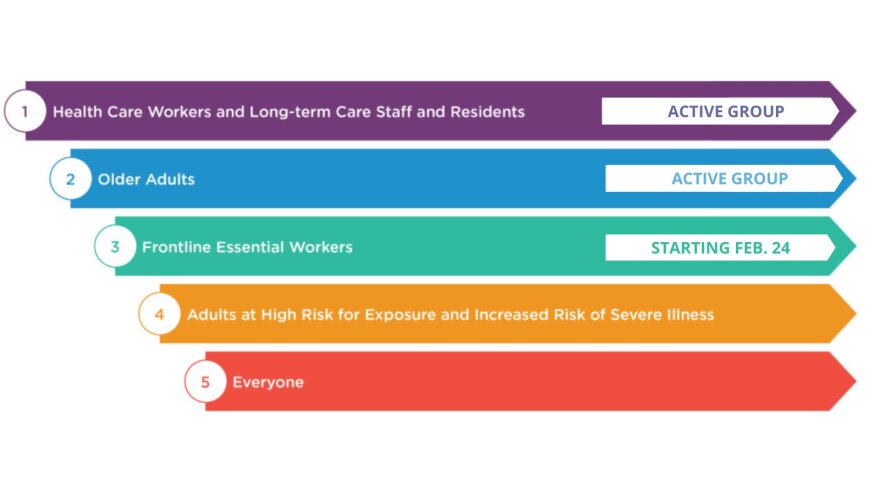North Carolina Gov. Roy Cooper announced Wednesday afternoon that educators and support staff will be eligible to receive a coronavirus vaccine starting Feb. 24 as part of a staggered rollout of the state's next phase of distribution.
The Democratic governor estimated that about 240,000 people would become eligible for the vaccinations in two weeks. The group includes child care workers, pre-K to 12th grade principals and teachers at public, private and charter schools and support staff, such as janitors, bus drivers and cafeteria workers.
“Moving to the next phase is good news. The challenge continues to be the very limited supply of the vaccine,” Cooper said.
Take a deeper dive into who qualifies as a frontline essential worker and will likely be eligible for the vaccine on March 10:
— WUNC (@wunc) February 10, 2021
+ Employees at grocery stores/pharmacies
+ Elected officials
+ Farm workers
+ Public safety workers
+ Social workers
More: https://t.co/JlzItK8wFF pic.twitter.com/wGqxwWuzSj
Other groups the state considers “frontline essential workers” will start becoming eligible on March 10, though public health officials are still evaluating whether it will prioritize certain subgroups within that population. That group includes manufacturing workers, grocery store clerks, college and university instructors and support staff, farmers, restaurant workers, mail carriers, court workers, elected officials, homeless shelter staff, public health workers, social workers, firefighters, EMS personnel, police officers, public transit workers and several others.
The state's top public health official, Dr. Mandy Cohen, said at Wednesday's news conference that the updated timetable gives counties two more weeks to continue prioritizing residents 65 years or older before they start opening up vaccinations to educators and staff.
Cohen said the state is working to create a portal in partnership with employers to enable schools and businesses to give vaccinators a list of workers who would like to receive their first dose. Even so, the state does not have an ID requirement that would compel residents to provide proof of their profession at vaccination sites.
“We do not have an ID requirement," Cohen said. "We want to make sure we are moving things along with speed and equity.”
Those who see providers flagrantly defying distribution guidelines could report incidents to state health officials. But Cooper acknowledged it will be harder to maintain a rigid vaccine prioritization schedule as more and more populations become eligible.
“Obviously, you're gonna rely somewhat on people's honesty,” he said.
Cooper has encouraged all 115 of the state's K-12 public school districts to swiftly reopen with at least partial in-person instruction while giving parents the option of having their kids continue to learn remotely. While he has strongly encouraged the reopening, Cooper does not support a bill from state lawmakers that would require schools to reopen.
The bill proposed by Republican state senators cleared that chamber earlier this week and is being considered by the House. If the House approves it as expected, it would head to Cooper's desk. If the governor vetoes it, state lawmakers could override his decision and turn the bill into a law.
The North Carolina Association of Educators, the state's top lobbying group for teachers, has repeatedly urged Cooper to make vaccines available to teachers. State health department guidance offers stricter safety requirements for middle schools and high schools and allows K-5 students to return without having to maintain 6 feet (1.8 meters) of physical distancing.
“We believe schools can reopen safely right now as long as health protocols are followed," Cooper said.
As March 10 approaches, the state hopes to receive additional supply from President Joe Biden's administration to further expand eligibility. In the meantime, demand greatly outpaces supply.
The state's largest county has cleared 23,000 names off its wait list of over 100,000 people, according to Dr. Jason Wittes, pharmacy director for Wake County. The county is set to receive nearly 20,000 new first doses this week and host a mass drive-thru vaccination clinic at PNC Arena in Raleigh.
In parts of the state where appointments are unable to be scheduled in advance, elderly residents could soon find themselves in competition with teachers for the limited supply of doses. Cooper hopes the staggered Phase 3 rollout will reduce burdens on providers and give them more time to develop systems that prioritize older adults.
“We're going to continue vaccinating people who are 65 and over," Cooper said. "I think providers know that they are a priority because they are at greater risk of death. As this vaccine process has gone along, I think providers have figured out that when you have a methodology and a process that things can go more smoothly.”








